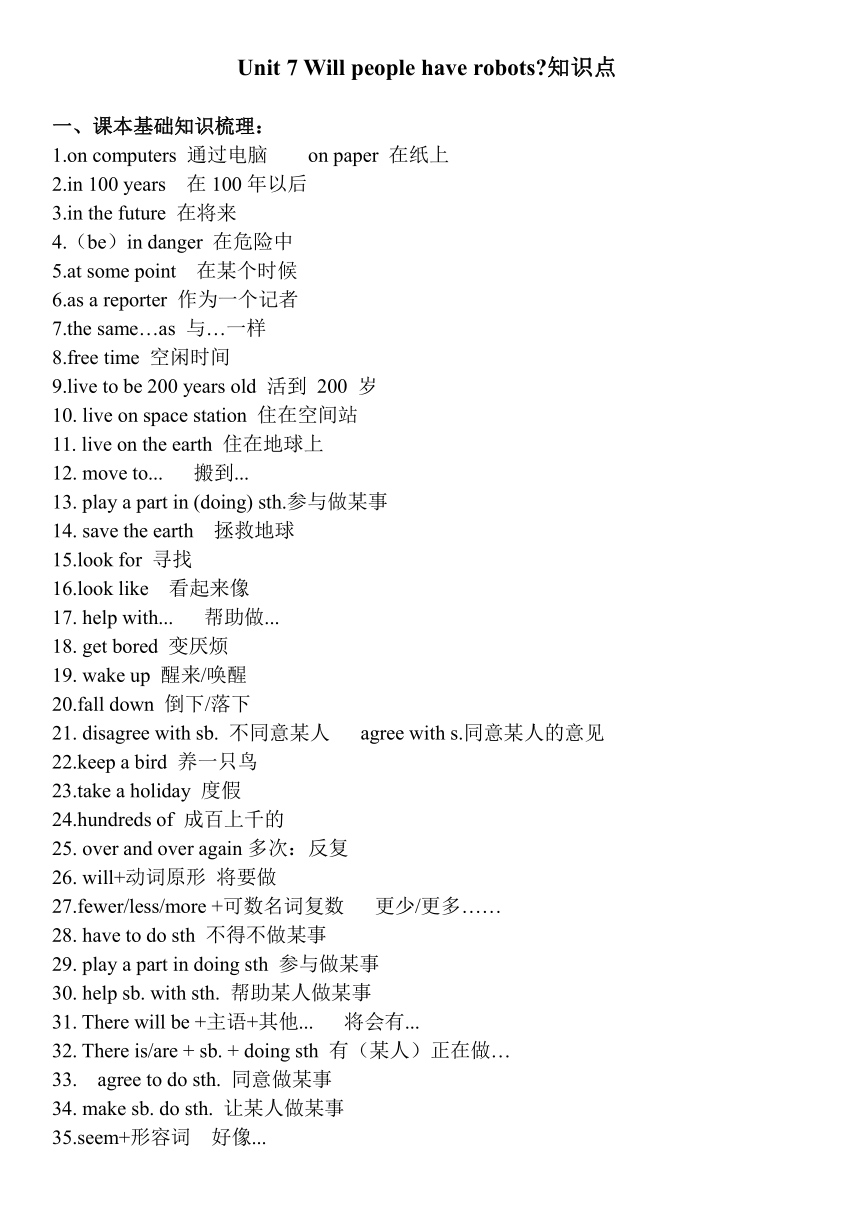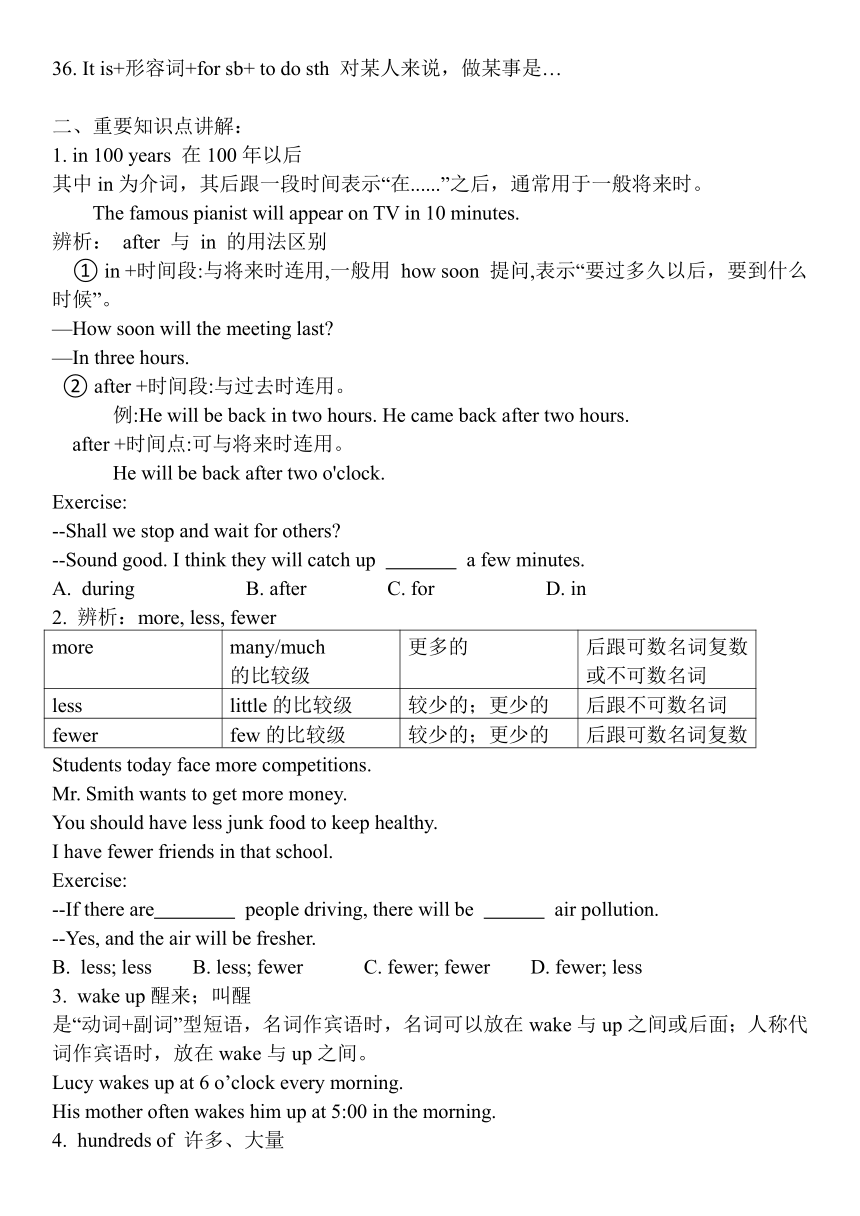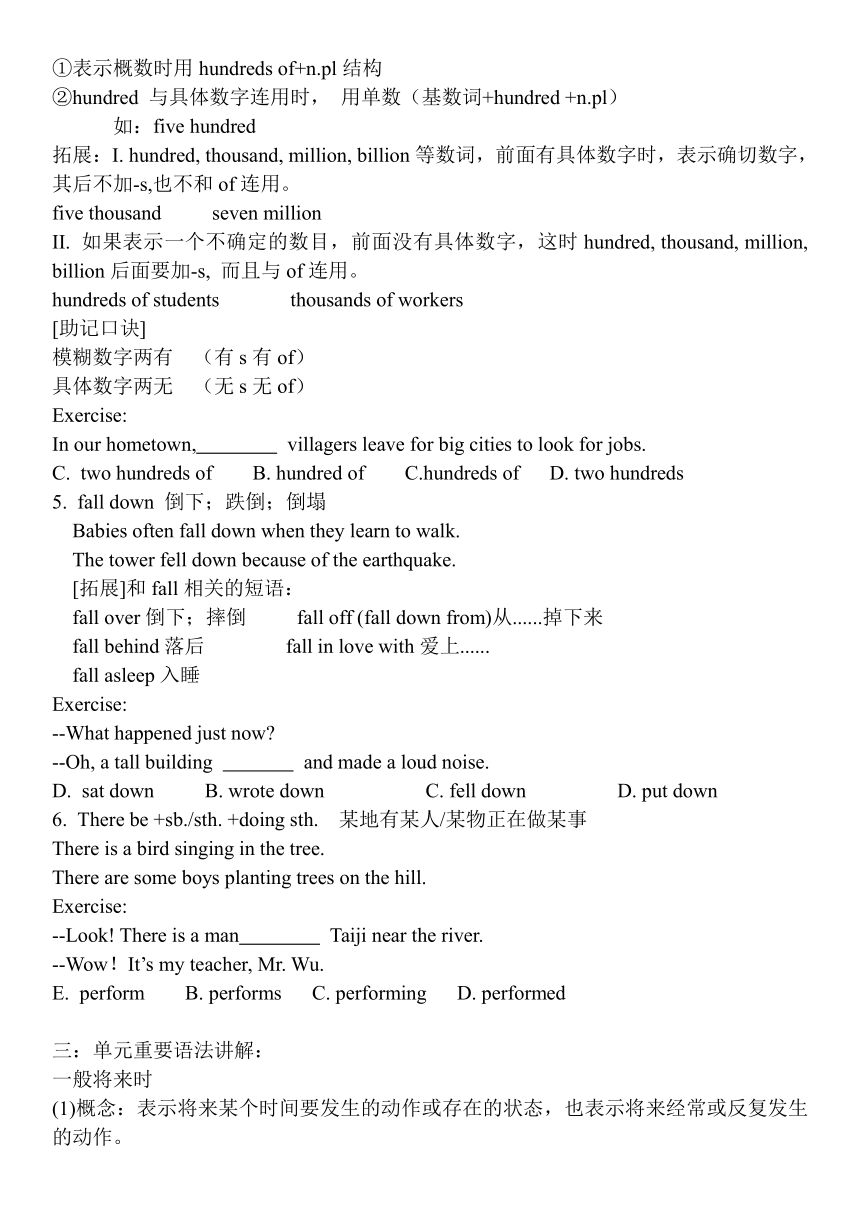人教八年级上册 Unit 7 Will people have robots?知识点
文档属性
| 名称 | 人教八年级上册 Unit 7 Will people have robots?知识点 |  | |
| 格式 | zip | ||
| 文件大小 | 71.5KB | ||
| 资源类型 | 教案 | ||
| 版本资源 | 人教新目标(Go for it)版 | ||
| 科目 | 英语 | ||
| 更新时间 | 2020-12-10 21:54:01 | ||
图片预览



文档简介
Unit
7
Will
people
have
robots?知识点
一、课本基础知识梳理:
1.on
computers
通过电脑
on
paper
在纸上
2.in
100
years
在100年以后
3.in
the
future
在将来
4.(be)in
danger
在危险中
5.at
some
point
在某个时候
6.as
a
reporter
作为一个记者
7.the
same…as
与…一样
8.free
time
空闲时间
9.live
to
be
200
years
old
活到
200
岁
10.
live
on
space
station
住在空间站
11.
live
on
the
earth
住在地球上
12.
move
to...
搬到...
13.
play
a
part
in
(doing)
sth.参与做某事
14.
save
the
earth
拯救地球
15.look
for
寻找
16.look
like
看起来像
17.
help
with...
帮助做...
18.
get
bored
变厌烦
19.
wake
up
醒来/唤醒
20.fall
down
倒下/落下
21.
disagree
with
sb.
不同意某人
agree
with
s.同意某人的意见
22.keep
a
bird
养一只鸟
23.take
a
holiday
度假
24.hundreds
of
成百上千的
25.
over
and
over
again多次:反复
26.
will+动词原形
将要做
27.fewer/less/more
+可数名词复数
更少/更多……
28.
have
to
do
sth
不得不做某事
29.
play
a
part
in
doing
sth
参与做某事
30.
help
sb.
with
sth.
帮助某人做某事
31.
There
will
be
+主语+其他...
将会有...
32.
There
is/are
+
sb.
+
doing
sth
有(某人)正在做…
33.
agree
to
do
sth.
同意做某事
34.
make
sb.
do
sth.
让某人做某事
35.seem+形容词
好像...
36.
It
is+形容词+for
sb+
to
do
sth
对某人来说,做某事是…
二、重要知识点讲解:
1.
in
100
years
在100年以后
其中in为介词,其后跟一段时间表示“在......”之后,通常用于一般将来时。
The
famous
pianist
will
appear
on
TV
in
10
minutes.
辨析:
after
与
in
的用法区别
①
in
+时间段:与将来时连用,一般用
how
soon
提问,表示“要过多久以后,要到什么时候”。
—How
soon
will
the
meeting
last?
—In
three
hours.
②
after
+时间段:与过去时连用。
例:He
will
be
back
in
two
hours.
He
came
back
after
two
hours.
after
+时间点:可与将来时连用。
He
will
be
back
after
two
o'clock.
Exercise:
--Shall
we
stop
and
wait
for
others?
--Sound
good.
I
think
they
will
catch
up
a
few
minutes.
during
B.
after
C.
for
D.
in
辨析:more,
less,
fewer
more
many/much的比较级
更多的
后跟可数名词复数或不可数名词
less
little的比较级
较少的;更少的
后跟不可数名词
fewer
few的比较级
较少的;更少的
后跟可数名词复数
Students
today
face
more
competitions.
Mr.
Smith
wants
to
get
more
money.
You
should
have
less
junk
food
to
keep
healthy.
I
have
fewer
friends
in
that
school.
Exercise:
--If
there
are
people
driving,
there
will
be
air
pollution.
--Yes,
and
the
air
will
be
fresher.
less;
less
B.
less;
fewer
C.
fewer;
fewer
D.
fewer;
less
wake
up醒来;叫醒
是“动词+副词”型短语,名词作宾语时,名词可以放在wake与up之间或后面;人称代词作宾语时,放在wake与up之间。
Lucy
wakes
up
at
6
o’clock
every
morning.
His
mother
often
wakes
him
up
at
5:00
in
the
morning.
hundreds
of
许多、大量
①表示概数时用hundreds
of+n.pl结构
②hundred
与具体数字连用时,
用单数(基数词+hundred
+n.pl)
如:five
hundred
拓展:I.
hundred,
thousand,
million,
billion等数词,前面有具体数字时,表示确切数字,其后不加-s,也不和of连用。
five
thousand
seven
million
II.
如果表示一个不确定的数目,前面没有具体数字,这时hundred,
thousand,
million,
billion后面要加-s,
而且与of连用。
hundreds
of
students
thousands
of
workers
[助记口诀]
模糊数字两有
(有s有of)
具体数字两无
(无s无of)
Exercise:
In
our
hometown,
villagers
leave
for
big
cities
to
look
for
jobs.
two
hundreds
of
B.
hundred
of
C.hundreds
of
D.
two
hundreds
fall
down
倒下;跌倒;倒塌
Babies
often
fall
down
when
they
learn
to
walk.
The
tower
fell
down
because
of
the
earthquake.
[拓展]和fall相关的短语:
fall
over倒下;摔倒
fall
off
(fall
down
from)从......掉下来
fall
behind落后
fall
in
love
with爱上......
fall
asleep入睡
Exercise:
--What
happened
just
now?
--Oh,
a
tall
building
and
made
a
loud
noise.
sat
down
B.
wrote
down
C.
fell
down
D.
put
down
There
be
+sb./sth.
+doing
sth.
某地有某人/某物正在做某事
There
is
a
bird
singing
in
the
tree.
There
are
some
boys
planting
trees
on
the
hill.
Exercise:
--Look!
There
is
a
man
Taiji
near
the
river.
--Wow!It’s
my
teacher,
Mr.
Wu.
perform
B.
performs
C.
performing
D.
performed
三:单元重要语法讲解:
一般将来时
(1)概念:表示将来某个时间要发生的动作或存在的状态,也表示将来经常或反复发生的动作。
I
will
come
to
see
you
next
week.
常用的时间状语:tomorrow,
next
week/month/year...
in
the
future,
In+一段时间,
from
now
on,
this
year/term/week
(3)句式结构:
⑴肯定式:主语
+
will/shall
+
动词原形
+
其他
(will
用于各种人称,shall
用于第一人称)
We
will
see
a
film
tomorrow
afternoon.
⑵否定式:主语+
will/shall+
not+动词原形+其他.
will
not
=
won’t
We
won’t
leave
before
nine.
⑶一般疑问句:
Will/Shall+主语+动词原形+其他?
肯定回答:Yes,
主语+will/shall.
否定回答:No,
主语+won’t/shan’t
--Will
you
come
to
school
tomorrow?.
--Yes,
I
will.
特殊疑问句:疑问词+
Will/Shall+(主语+)动词原形+其他?
What
will
you
do
in
ten
years?
⑷There
be
的一般将来时:
There
will
be+主语+其他...
将会有...
①一般疑问句形式为:Will
there
be
+
主语
+
其他?
②肯定回答:Yes,
there
will.
否定回答:No,
there
won’t.
③否定形式是:
There
won’t
be
+
主语
+
其他,
将不会有……
④特殊疑问句是:
疑问词/
词组
+
一般疑问句?
When
will
there
be
a
nice
match?何时会有一场精彩的球赛?
注意:there
be
句型中不能用
have\has。
be
going
to
与
will
的区别:
①
对未来事情的预测用“
will
+
动词原形”表达,will
没有人称和数的变化,变否定句要在will
后面加not,
也可用will
后面加
not,或者缩略式won’t,
变一般疑问句将will
提至句首。
Will
planes
be
large
in
the
future?
Yes,
they
will.
/
No,
they
won’t.
②will
常表示说话人相信或希望要发生的事情,而be
going
to
指根据客观迹象很快就要发生的事情。
I
believe
Lucy
will
be
a
great
doctor.
Look
at
the
clouds.
There
is
going
to
be
a
storm.
③
陈述将来的某个事实用will.
I
will
ten
years
old
next
year.
④
表示计划、打算要做的事情用
be
going
to,
而不用
will.
I’m
going
to
buy
a
computer
this
month.
---Let’s
discuss
the
plan,
shall
we?
----Not
now.
I
______
to
an
interview.
A.
go
B.
went
C.
am
going
D.
was
going
(6)一般现在时表将来
①表示按规定或时间表预计要发生的动作,用一般现在时表将来,如start,
leave,
come,
go等。
The
term
starts
on
September
1st.
②在时间或条件状语从句中,要用一般现在时表将来。
We
will
have
a
sports
meeting
if
it
doesn’t
rain
next
Friday.
现在进行时表将来
某些表示趋向性或转移性的动词,如come,
go,
fly,
arrive,
leave等,常用现在进行时表将来。
They
are
flying
to
Beijing
next
Sunday.
We
are
leaving
for
London
tomorrow.
语法专练:
一、单项选择。
(
)
1.
There
__________
a
meeting
tomorrow
afternoon.
A.
will
be
going
to
B.
will
going
to
be
C.
is
going
to
be
D.
will
go
to
be
(
)
2.
Charlie
________
here
next
month.
A.
isn’t
working
B.
doesn’t
working
C.
isn’t
going
to
working
D.
won’t
work
(
)
3.
He
________
very
busy
this
week,
he
________
free
next
week.
A.
will
be;
is
B.
is;
is
C.
will
be;
will
be
D.
is;
will
be
(
)
4.
There
________
a
dolphin
show
in
the
zoo
tomorrow
evening.
A.
was
B.
is
going
to
have
C.
will
have
D.
is
going
to
be
(
)
5.
–________
you
________
free
tomorrow?
–
No.
I
________
free
the
day
after
tomorrow.
A.
Are;
going
to;
will
B.
Are;
going
to
be;
will
C.
Are;
going
to;
will
be
D.
Are;
going
to
be;
will
be
(
)
6.
Mother
________
me
a
nice
present
on
my
next
birthday.
A.
will
gives
B.
will
give
C.
gives
D.
give
(
)
7.
If
it
________
tomorrow,
we’ll
go
roller-skating.
A.
isn’t
rain
B.
won’t
rain
C.
doesn’t
rain
D.
doesn’t
fine
(
)
8.
Who
________
we
________
swimming
with
tomorrow
afternoon?
A.
will;
go
B.
do;
go
C.
will;
going
D.
shall;
go
(
)
9.
The
day
after
tomorrow
they
________
a
volleyball
match.
A.
will
watching
B.
watches
C.
is
watching
D.
is
going
to
watch
(
)
10.
________
you
________
free
next
Sunday?
A.
Will;
are
B.
Will;
be
C.
Do;
be
D.
Are;
be
(
)
11.
He
________
there
at
ten
tomorrow
morning.
A.
will
B.
is
C.
will
be
D.
be
(
)
12.
It
________
us
a
long
time
to
learn
English
well.
A.
takes
B.
will
take
C.
spends
D.
will
spend
二、句型转换。
1.
People
in
the
north
often
go
skating
in
winter.
(next
winter)
2.
There
are
two
cinemas
in
that
town.
(next
year)
3.
China
is
a
modern
and
strong
country.(in
twenty
years)
4.
She
is
a
conductor
of
a
train.(soon)
5.
Li
Ming
is
ten
years
old.(next
year)
7
Will
people
have
robots?知识点
一、课本基础知识梳理:
1.on
computers
通过电脑
on
paper
在纸上
2.in
100
years
在100年以后
3.in
the
future
在将来
4.(be)in
danger
在危险中
5.at
some
point
在某个时候
6.as
a
reporter
作为一个记者
7.the
same…as
与…一样
8.free
time
空闲时间
9.live
to
be
200
years
old
活到
200
岁
10.
live
on
space
station
住在空间站
11.
live
on
the
earth
住在地球上
12.
move
to...
搬到...
13.
play
a
part
in
(doing)
sth.参与做某事
14.
save
the
earth
拯救地球
15.look
for
寻找
16.look
like
看起来像
17.
help
with...
帮助做...
18.
get
bored
变厌烦
19.
wake
up
醒来/唤醒
20.fall
down
倒下/落下
21.
disagree
with
sb.
不同意某人
agree
with
s.同意某人的意见
22.keep
a
bird
养一只鸟
23.take
a
holiday
度假
24.hundreds
of
成百上千的
25.
over
and
over
again多次:反复
26.
will+动词原形
将要做
27.fewer/less/more
+可数名词复数
更少/更多……
28.
have
to
do
sth
不得不做某事
29.
play
a
part
in
doing
sth
参与做某事
30.
help
sb.
with
sth.
帮助某人做某事
31.
There
will
be
+主语+其他...
将会有...
32.
There
is/are
+
sb.
+
doing
sth
有(某人)正在做…
33.
agree
to
do
sth.
同意做某事
34.
make
sb.
do
sth.
让某人做某事
35.seem+形容词
好像...
36.
It
is+形容词+for
sb+
to
do
sth
对某人来说,做某事是…
二、重要知识点讲解:
1.
in
100
years
在100年以后
其中in为介词,其后跟一段时间表示“在......”之后,通常用于一般将来时。
The
famous
pianist
will
appear
on
TV
in
10
minutes.
辨析:
after
与
in
的用法区别
①
in
+时间段:与将来时连用,一般用
how
soon
提问,表示“要过多久以后,要到什么时候”。
—How
soon
will
the
meeting
last?
—In
three
hours.
②
after
+时间段:与过去时连用。
例:He
will
be
back
in
two
hours.
He
came
back
after
two
hours.
after
+时间点:可与将来时连用。
He
will
be
back
after
two
o'clock.
Exercise:
--Shall
we
stop
and
wait
for
others?
--Sound
good.
I
think
they
will
catch
up
a
few
minutes.
during
B.
after
C.
for
D.
in
辨析:more,
less,
fewer
more
many/much的比较级
更多的
后跟可数名词复数或不可数名词
less
little的比较级
较少的;更少的
后跟不可数名词
fewer
few的比较级
较少的;更少的
后跟可数名词复数
Students
today
face
more
competitions.
Mr.
Smith
wants
to
get
more
money.
You
should
have
less
junk
food
to
keep
healthy.
I
have
fewer
friends
in
that
school.
Exercise:
--If
there
are
people
driving,
there
will
be
air
pollution.
--Yes,
and
the
air
will
be
fresher.
less;
less
B.
less;
fewer
C.
fewer;
fewer
D.
fewer;
less
wake
up醒来;叫醒
是“动词+副词”型短语,名词作宾语时,名词可以放在wake与up之间或后面;人称代词作宾语时,放在wake与up之间。
Lucy
wakes
up
at
6
o’clock
every
morning.
His
mother
often
wakes
him
up
at
5:00
in
the
morning.
hundreds
of
许多、大量
①表示概数时用hundreds
of+n.pl结构
②hundred
与具体数字连用时,
用单数(基数词+hundred
+n.pl)
如:five
hundred
拓展:I.
hundred,
thousand,
million,
billion等数词,前面有具体数字时,表示确切数字,其后不加-s,也不和of连用。
five
thousand
seven
million
II.
如果表示一个不确定的数目,前面没有具体数字,这时hundred,
thousand,
million,
billion后面要加-s,
而且与of连用。
hundreds
of
students
thousands
of
workers
[助记口诀]
模糊数字两有
(有s有of)
具体数字两无
(无s无of)
Exercise:
In
our
hometown,
villagers
leave
for
big
cities
to
look
for
jobs.
two
hundreds
of
B.
hundred
of
C.hundreds
of
D.
two
hundreds
fall
down
倒下;跌倒;倒塌
Babies
often
fall
down
when
they
learn
to
walk.
The
tower
fell
down
because
of
the
earthquake.
[拓展]和fall相关的短语:
fall
over倒下;摔倒
fall
off
(fall
down
from)从......掉下来
fall
behind落后
fall
in
love
with爱上......
fall
asleep入睡
Exercise:
--What
happened
just
now?
--Oh,
a
tall
building
and
made
a
loud
noise.
sat
down
B.
wrote
down
C.
fell
down
D.
put
down
There
be
+sb./sth.
+doing
sth.
某地有某人/某物正在做某事
There
is
a
bird
singing
in
the
tree.
There
are
some
boys
planting
trees
on
the
hill.
Exercise:
--Look!
There
is
a
man
Taiji
near
the
river.
--Wow!It’s
my
teacher,
Mr.
Wu.
perform
B.
performs
C.
performing
D.
performed
三:单元重要语法讲解:
一般将来时
(1)概念:表示将来某个时间要发生的动作或存在的状态,也表示将来经常或反复发生的动作。
I
will
come
to
see
you
next
week.
常用的时间状语:tomorrow,
next
week/month/year...
in
the
future,
In+一段时间,
from
now
on,
this
year/term/week
(3)句式结构:
⑴肯定式:主语
+
will/shall
+
动词原形
+
其他
(will
用于各种人称,shall
用于第一人称)
We
will
see
a
film
tomorrow
afternoon.
⑵否定式:主语+
will/shall+
not+动词原形+其他.
will
not
=
won’t
We
won’t
leave
before
nine.
⑶一般疑问句:
Will/Shall+主语+动词原形+其他?
肯定回答:Yes,
主语+will/shall.
否定回答:No,
主语+won’t/shan’t
--Will
you
come
to
school
tomorrow?.
--Yes,
I
will.
特殊疑问句:疑问词+
Will/Shall+(主语+)动词原形+其他?
What
will
you
do
in
ten
years?
⑷There
be
的一般将来时:
There
will
be+主语+其他...
将会有...
①一般疑问句形式为:Will
there
be
+
主语
+
其他?
②肯定回答:Yes,
there
will.
否定回答:No,
there
won’t.
③否定形式是:
There
won’t
be
+
主语
+
其他,
将不会有……
④特殊疑问句是:
疑问词/
词组
+
一般疑问句?
When
will
there
be
a
nice
match?何时会有一场精彩的球赛?
注意:there
be
句型中不能用
have\has。
be
going
to
与
will
的区别:
①
对未来事情的预测用“
will
+
动词原形”表达,will
没有人称和数的变化,变否定句要在will
后面加not,
也可用will
后面加
not,或者缩略式won’t,
变一般疑问句将will
提至句首。
Will
planes
be
large
in
the
future?
Yes,
they
will.
/
No,
they
won’t.
②will
常表示说话人相信或希望要发生的事情,而be
going
to
指根据客观迹象很快就要发生的事情。
I
believe
Lucy
will
be
a
great
doctor.
Look
at
the
clouds.
There
is
going
to
be
a
storm.
③
陈述将来的某个事实用will.
I
will
ten
years
old
next
year.
④
表示计划、打算要做的事情用
be
going
to,
而不用
will.
I’m
going
to
buy
a
computer
this
month.
---Let’s
discuss
the
plan,
shall
we?
----Not
now.
I
______
to
an
interview.
A.
go
B.
went
C.
am
going
D.
was
going
(6)一般现在时表将来
①表示按规定或时间表预计要发生的动作,用一般现在时表将来,如start,
leave,
come,
go等。
The
term
starts
on
September
1st.
②在时间或条件状语从句中,要用一般现在时表将来。
We
will
have
a
sports
meeting
if
it
doesn’t
rain
next
Friday.
现在进行时表将来
某些表示趋向性或转移性的动词,如come,
go,
fly,
arrive,
leave等,常用现在进行时表将来。
They
are
flying
to
Beijing
next
Sunday.
We
are
leaving
for
London
tomorrow.
语法专练:
一、单项选择。
(
)
1.
There
__________
a
meeting
tomorrow
afternoon.
A.
will
be
going
to
B.
will
going
to
be
C.
is
going
to
be
D.
will
go
to
be
(
)
2.
Charlie
________
here
next
month.
A.
isn’t
working
B.
doesn’t
working
C.
isn’t
going
to
working
D.
won’t
work
(
)
3.
He
________
very
busy
this
week,
he
________
free
next
week.
A.
will
be;
is
B.
is;
is
C.
will
be;
will
be
D.
is;
will
be
(
)
4.
There
________
a
dolphin
show
in
the
zoo
tomorrow
evening.
A.
was
B.
is
going
to
have
C.
will
have
D.
is
going
to
be
(
)
5.
–________
you
________
free
tomorrow?
–
No.
I
________
free
the
day
after
tomorrow.
A.
Are;
going
to;
will
B.
Are;
going
to
be;
will
C.
Are;
going
to;
will
be
D.
Are;
going
to
be;
will
be
(
)
6.
Mother
________
me
a
nice
present
on
my
next
birthday.
A.
will
gives
B.
will
give
C.
gives
D.
give
(
)
7.
If
it
________
tomorrow,
we’ll
go
roller-skating.
A.
isn’t
rain
B.
won’t
rain
C.
doesn’t
rain
D.
doesn’t
fine
(
)
8.
Who
________
we
________
swimming
with
tomorrow
afternoon?
A.
will;
go
B.
do;
go
C.
will;
going
D.
shall;
go
(
)
9.
The
day
after
tomorrow
they
________
a
volleyball
match.
A.
will
watching
B.
watches
C.
is
watching
D.
is
going
to
watch
(
)
10.
________
you
________
free
next
Sunday?
A.
Will;
are
B.
Will;
be
C.
Do;
be
D.
Are;
be
(
)
11.
He
________
there
at
ten
tomorrow
morning.
A.
will
B.
is
C.
will
be
D.
be
(
)
12.
It
________
us
a
long
time
to
learn
English
well.
A.
takes
B.
will
take
C.
spends
D.
will
spend
二、句型转换。
1.
People
in
the
north
often
go
skating
in
winter.
(next
winter)
2.
There
are
two
cinemas
in
that
town.
(next
year)
3.
China
is
a
modern
and
strong
country.(in
twenty
years)
4.
She
is
a
conductor
of
a
train.(soon)
5.
Li
Ming
is
ten
years
old.(next
year)
同课章节目录
- Unit 1 Where did you go on vacation?
- Section A
- Section B
- Unit 2 How often do you exercise?
- Section A
- Section B
- Unit 3 I'm more outgoing than my sister.
- Section A
- Section B
- Unit 4 What's the best movie theater?
- Section A
- Section B
- Unit 5 Do you want to watch a game show?
- Section A
- Section B
- Unit 6 I'm going to study computer science.
- Section A
- Section B
- Unit 7 Will people have robots?
- Section A
- Section B
- Unit 8 How do you make a banana milk shake?
- Section A
- Section B
- Unit 9 Can you come to my party?
- Section A
- Section B
- Unit 10 If you go to the party, you'll have a grea
- Section A
- Section B
